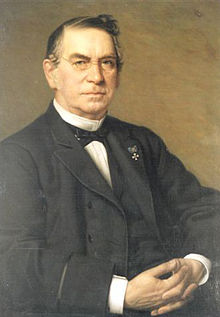Carl Leverkus

Carl Leverkus (born November 5, 1804 in Wermelskirchen , † February 1, 1889 in Leverkusen ) was a German chemist and chemical entrepreneur ; he is the namesake of the city of Leverkusen.
Career
He began an apprenticeship as a pharmacist in 1822 and then studied at the University of Marburg . After working as a pharmacist's assistant in Trier , he went to Paris , worked there in a pharmacy and studied chemistry in the evening at the Sorbonne . In 1829 he passed the pharmacist exam in Berlin . In Gießen he received his doctorate in 1830. phil. with a thesis on the chemistry of silver. The work was assessed by Justus von Liebig .
In 1834 he opened the first factory for the production of artificial ultramarine blue in Wermelskirchen . He later moved his factory to the Kahlberg near Wiesdorf . He named the newly emerging settlement "Leverkusen" after the Leverkusen family seat of the same name near Lennep , which is still a court in Remscheid today . The factory became a model company with the latest technical facilities and a great commercial success.
Carl Leverkus and his wife Juliane Augusta got involved in social issues; So they took care of the interests of the workforce intensively , founded their own factory choir and their own voluntary factory fire brigade , built apartments and founded a consumer association for the workers.
In 1884 Leverkus was given the honorary title of " Secret Commerce Councilor " and the honorary citizenship of Wermelskirchen.
In 1890 his sons founded the company Vereinigte Ultramarinwerke, formerly Leverkus, Zeltner and Consorten . The largest partner was the Nuremberg ultramarine factory Joh. Zeltner.
After his death in 1891, his sons sold part of the factory premises with the Alizarin factory in Wiesdorf to the Elberfelder paint factories vorm. Friedr. Bayer & Co AG . Carl Leverkus' factory was the cornerstone of what is now Bayer AG's plant in Leverkusen.
Leverkus married Juliane Auguste Kipper in 1838 and they had eleven children. He was buried in Wermelskirchen. In 1930 he was posthumously named after the city of Leverkusen . The German artist Martin Kippenberger was a great-great-grandson of Leverkus .
See also
literature
- Karl Schumacher: Leverkus, Carl. In: New German Biography (NDB). Volume 14, Duncker & Humblot, Berlin 1985, ISBN 3-428-00195-8 , pp. 389-391 ( digitized version ).
swell
- ^ Gravestone in the Wermelskirchen cemetery
- ↑ Family seat ( Memento of the original from December 3, 2012 in the Internet Archive ) Info: The archive link was inserted automatically and has not yet been checked. Please check the original and archive link according to the instructions and then remove this notice.
- ↑ Carl Leverkus (1804–1889), pharmacist, chemist, entrepreneur: 7 daughters and 4 sons, Julius (* December 22, 1840 in Wermelskirchen, † August 1, 1890 in Leverkusen) & Carl (* July 19, 1845 in Wiesbaden, † 1925 in Wildungen), both partners since 1869. Leverkusen company, Ernst (* 1851 † 1883), partner 1879–83, and Otto (born April 11, 1856 in Wermelskirchen, † October 13, 1934 in Wiesbaden), partner since 1883.
Web links
| personal data | |
|---|---|
| SURNAME | Leverkus, Carl |
| BRIEF DESCRIPTION | German chemical entrepreneur |
| DATE OF BIRTH | November 5, 1804 |
| PLACE OF BIRTH | Wermelskirchen |
| DATE OF DEATH | February 1, 1889 |
| Place of death | Leverkusen |